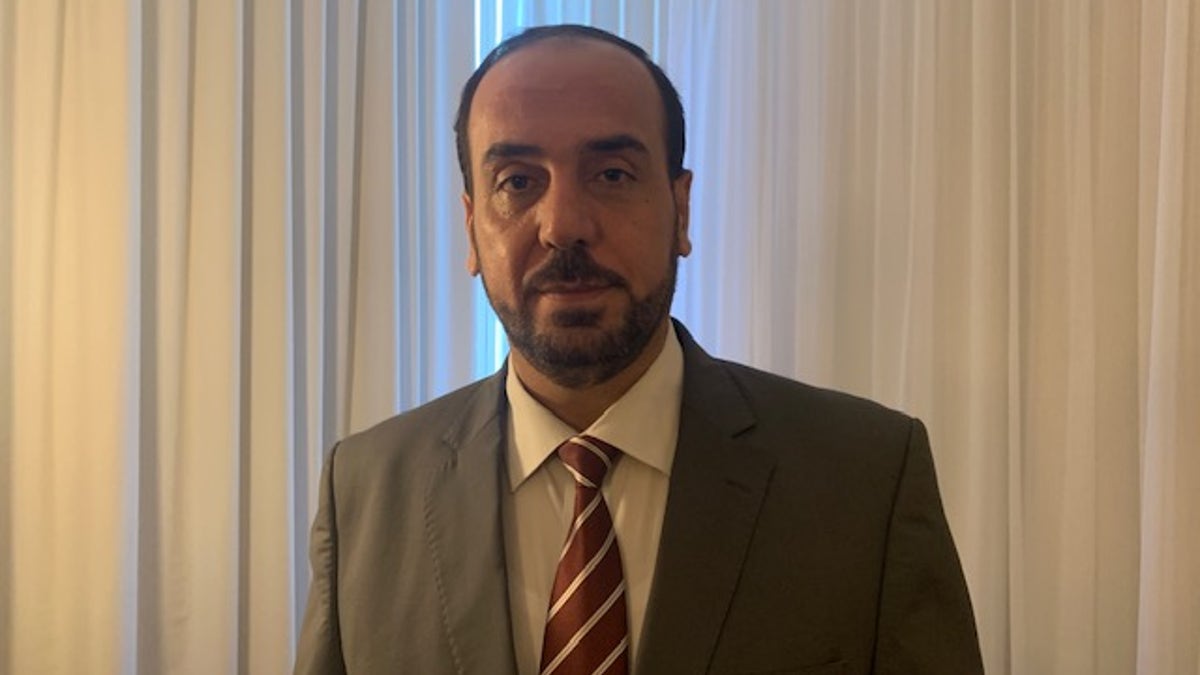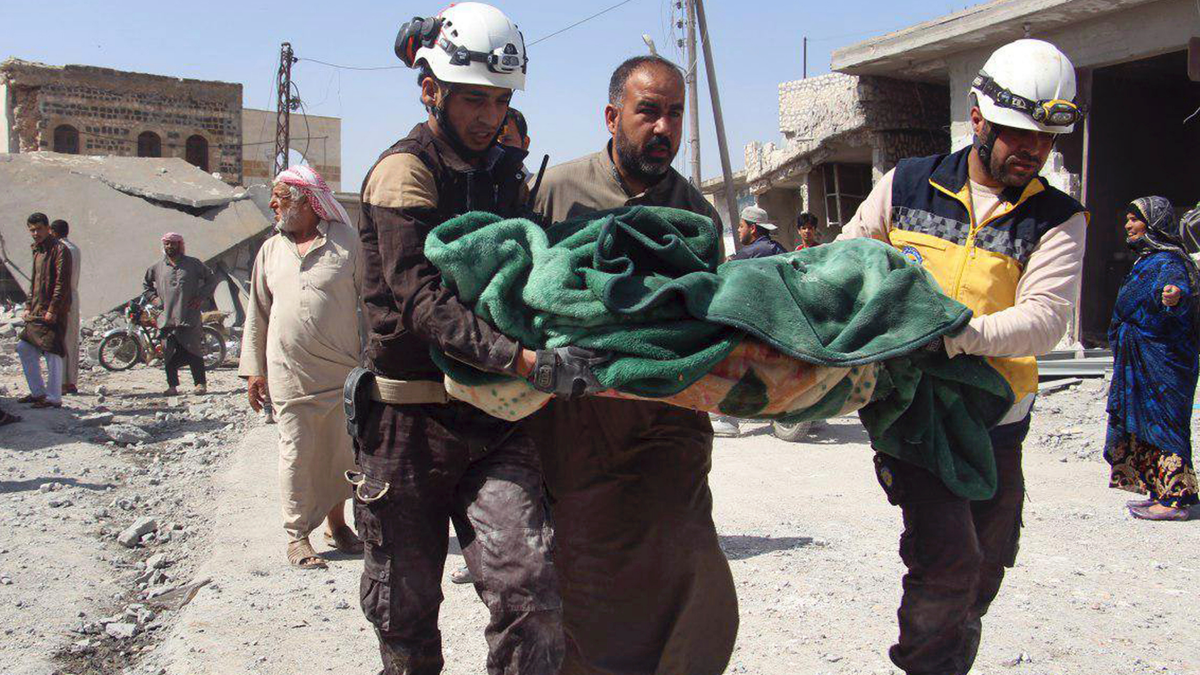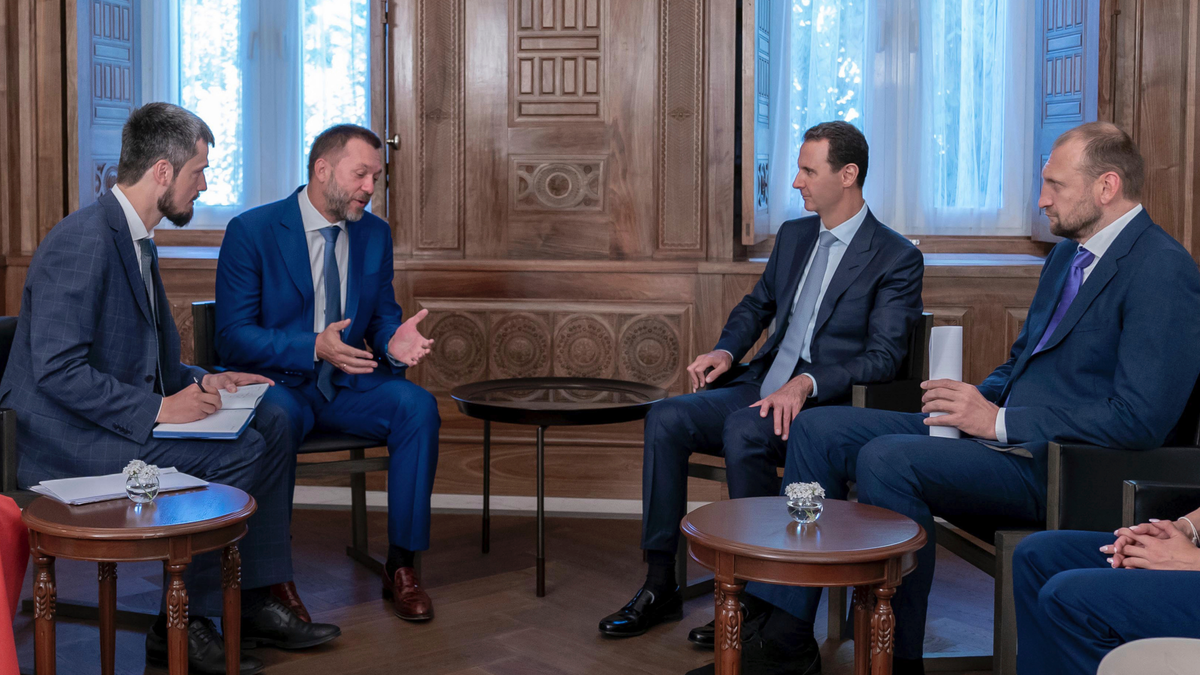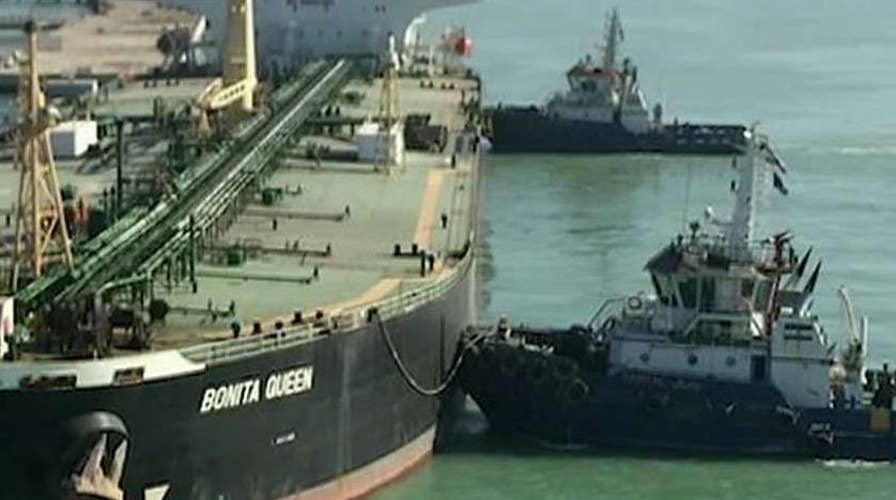New tanker smuggling Iranian oil to Syria, sources say
A new tanker filled with Iranian oil is on its way to Syria in a violation of current U.S. sanctions, sources tell Fox News; Trey Yingst has the details.
After more than eight years of war and bloodshed in Syria, the Iranian presence in the nation is at an all-time high, warned the top Syrian opposition figure.
“Iranian influence is getting bigger and bigger. They are the ones controlling the State of Syria, the Army of Syria, the security of Syria and are infiltrating the society such as the schools and religious sites,” Nasr Al-Hariri, president of the Syrian Negotiation Commission (SNC), told Fox News following the U.N. General Assembly last week. “While the air cover is being provided to the government by Russia, the troops on the ground are controlled by Iran.”
Most disturbing, Hariri underscored, is that many who oppose the government and have been rendered little choice but return to their broken lives and homes are now aligning with Iranian militias for survival.
“They see the allies have left us alone inside Syria, so they can only protect themselves this way, and Iran is giving them some incentives to join,” he explained. “They get salaries between $300-600 a month, and a security card to go all over the country without being interrupted or harmed at Syrian regime checkpoints. This is their protection, and it is very dangerous. If the situation continues like this, the number of recruited Iranian people will gradually increase.”
FAMILY MURDER SUICIDES IN YEMEN HIGHLIGHT DEPTHS OF WAR-INDUCED MENTAL HEALTH CRISIS
In April, the Syrian government – backed by Russian air support – launched an intensive campaign to reclaim Idlib, the last enduring opposition stronghold. But after four months and countless lives and injured later, the majority of the region was still out of their reach.
“The regime was not able to get any significant progress on the ground, so for that reason, the Iranian militias have intervened to help more,” Hariri said.

Nasr Al-Hariri, president of the Syrian Negotiation Commission (SNC) (Fox News/Hollie McKay)
Hariri asserted that there are more than 60 militias in Syria that are either Iranian or affiliated with Iran.
“They (Iran) are trying to establish their own military strategy inside Syria and infiltrate Syrian society,” he continued. “They are recruiting ex-fighters of the Syrian Army as part of their own militias inside Syria so they can see them in the future because their projects in the wider region depend on chaos.”
The opposition leader contended that Iran is explicitly not involved in the ongoing peace-centered talks that other players such as Russia and Turkey engage in, nor does it co-operate with inter-country military dialogues, because their vision does not require diplomacy.
“Iranians are working to destroy any effort for an agreement inside Syria because they know that at the moment Syrians reach a political solution, they will be forced to go outside of Syria and they don’t want to reach that point,” he said. “We can’t imagine that there will be a political solution in Syria while the Iranian Revolutionary Guard is present, and the militias are exercising their maligned activities.”
From his point of view, the United States and its coalition partners should adopt a similar policy in the North-West enclave of Idlib to the one they have established in the North-East of Syria, in supporting the Kurdish-led Syrian Democratic Forces (SDF).
“Americans have protected that area to be assured that ISIS does not enter the area and have prevented the regime and Russia from entering,” Hariri said. “They can say again; we want to be sure Iran does not enter this (Idlib) area until we can be sure there is a serious political process on the way.”

Members of the Syrian Civil Defense workers carrying a victim after a deadly airstrike hit a market killing several people in the village of Ras el-Ain, in the northwestern province of Idlib, Syria, Tuesday, May 7, 2019. (Syrian Civil Defense White Helmets via AP)
Representing the fractured and pariah Damascus government at the U.N.'s General Assembly was Foreign Minister Walid al-Muallem, who demanded the prompt pullout of all foreign forces. He insisted that the country reserves the right to take action against any unauthorized forces in their terrain.
Muallem, according to officials not authorized to speak on the record, was not granted the privileges given to most global diplomats in visiting New York for the assembly. He faced movement restrictions and was forced to wait in “regular” rather than “diplomatic” immigration lines.
Since the start of Syria’s bloody revolution in 2011, Iran has been playing an increasingly pivotal role in keeping President Bashar al-Assad in power. While Tehran endeavors to protect and disseminate its brand of Shia Islam – of which Assad is a Shia offshoot known as Alawite – experts contend their interests run deeper.
“Iran has invested considerable amounts of blood, treasure, and national reputation to defend the Assad regime,” said Behnam Ben Taleblu, a senior fellow at the Foundation for Defense of Democracies (FDD). “That is Iran’s anchor in the Mediterranean and the Levantine world. Without Syria, the Iranian project to export the revolution would likely face collapse.”
WHERE DOES MEXICO REALLY GET ITS GUNS?
According to Taleblu, Syria is also integral to Iran’s more recent goal to create a land corridor from Iran “to ferry men, money, and munitions to battlefields across the Middle East and eventually reach the eastern Mediterranean.”
“And while the Syrian conflict has been horrifying humanitarian experience, it has been a strategic boost for the Islamic Republic,” he cautioned. “The regime is using the experience learned in the war to make its militia’s inter-operable and better connected for the next conflict.”
Tehran has long been providing Damascus with crucial military supplies and equipment, along with deploying intelligence services, law enforcement personnel, and even their elite IRGC Ground Forces. In 2012, Iran began establishing pro-government militias to support the Assad regime and the missions of Lebanese Hezbollah often deemed a proxy of the Iranian government.

Syrian President Bashar Assad, second right, meets with a Russian delegation in Damascus, Syria, Aug. 20, 2019. (SANA via AP)
Even amid its own financial turmoil and blistering international sanctions, the Iranian government – per U.N. estimates – has spent upwards of $6 billion annually to bolster the Assad regime, a sum that does not include the scope of its own military operation.
CLICK HERE FOR THE ALL-NEW FOXBUSINESS.COM
And the next step for the broken and battered nation remains to be seen, with the future of the enduring Idlib still languishing in limbo.
“The international community has voices faint outcry against the violence in Idlib, just statements and condemnation but not responsive steps have been taken to stop it,” Hariri added. “Their lives are under threat, and if (another offensive) begins, 3.8 million will flood to Turkey and then into the rest of the world, and there will be another refugee crisis.”









































